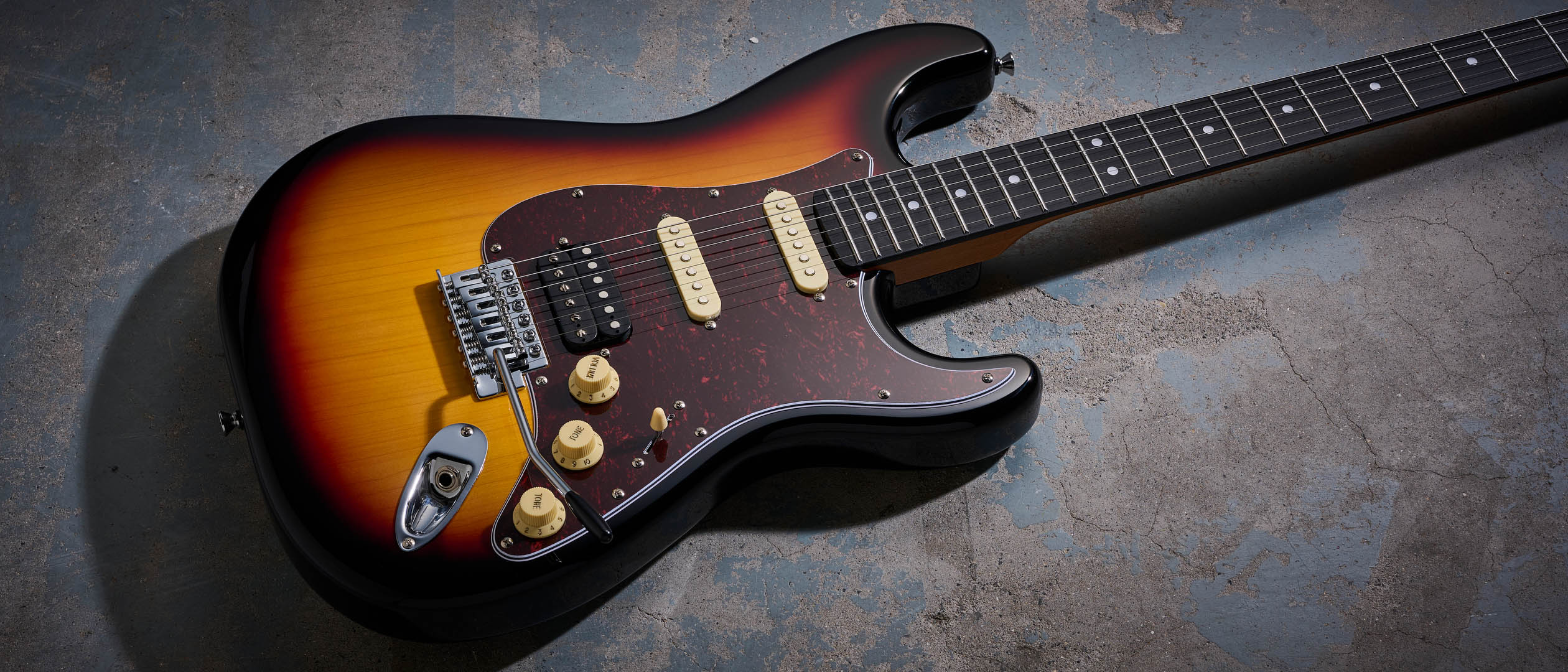Glenn Tipton looks back at 50 years of triumph and tragedy in Judas Priest
The guitar icon unpacks the legacy of a band that helped define heavy metal as we know it, opens up on the rift with K.K. Downing and reveals how punk gave them a kick up the backside
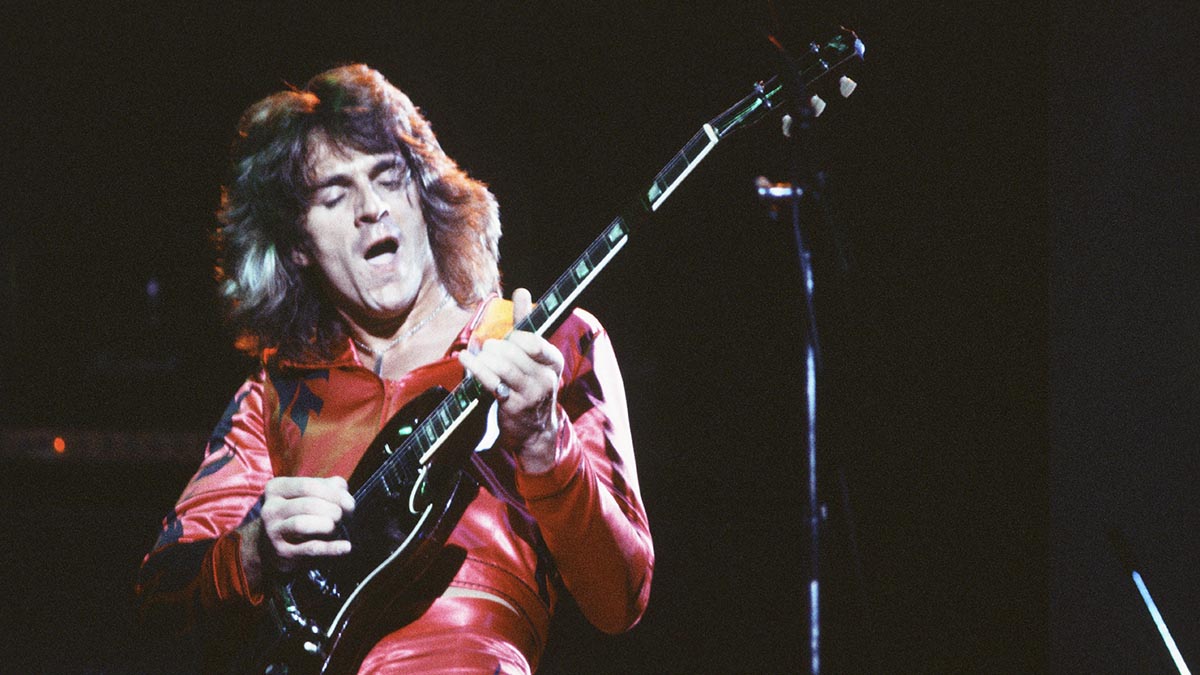
At the time of our interview, Judas Priest guitarist Glenn Tipton is getting ready for another victory lap to celebrate 50-plus years of the group’s eclectic, groundbreaking metal. Priest resumed their 50th Anniversary tour on March 4 in Peoria, Illinois, and dates are scheduled through June 14 in the band’s hometown of Birmingham, England, barring any more unexpected setbacks.
To coincide with the tour, Judas Priest released the mammoth 42-disc box set, 50 Heavy Metal Years of Music, which includes every album from their catalog as well as 13 previously unreleased discs of live material spanning from 1979 to 1991.
Also available is the 16-track single-disc taster, Reflections: 50 Heavy Metal Years of Music, a best-of that features nine album tracks and six live cuts from the box. 50 Heavy Metal Years of Music was entirely remastered by Tom Allom, who first worked with Judas Priest on the 1979 concert album Unleashed in the East, and who produced most of their best-selling records, including British Steel and Screaming for Vengeance.
“To have a boxset that is so all-encompassing and covers all our time with Judas Priest is amazing,” says Tipton from his estate in England. “50 years is a long time. You never think you’ll go on this long. I never thought I’d still be around now, let alone writing songs and performing a bit.”
It’s always a little strange for pioneer artists to pore through their back catalogs and unearth past stepping stones and revelations. For Tipton, it’s especially bittersweet since he’s coping with and combating Parkinson’s disease and has been unable to tour with Judas Priest since 2018, when producer Andy Sneap was recruited as the band’s second guitarist on stage. Since then, Tipton has performed encores as a special guest at various shows.
“I have good days and bad days,” Tipton says, speaking candidly about the illness he has struggled with for more than a decade. “I have to take my moment to catch a wave, if you know what I mean. But to walk onstage at the beginning of a show and hear the crowd scream, and then you kick into a Priest number – I miss that a lot.”
In one of the few interviews Tipton has set up, the guitarist talks about the boxset, reveals details about the band’s next studio album, reminisces over some of his proudest moments in Judas Priest and discusses how guitarist Richie Faulkner injected new life into the band, and Faulkner’s near-death experience onstage in Kentucky last September.
Get The Pick Newsletter
All the latest guitar news, interviews, lessons, reviews, deals and more, direct to your inbox!
Tipton also reveals – for the first time – details about a mishap he had in 2021 that left him practically freezing to death. And, after holding his tongue for years, he pointedly responds to disparaging allegations and accusations from founding Priest guitarist K.K. Downing.
How did you choose which albums and live recordings to include in 50 Heavy Metal Years of Music?
“All the albums are in there – every Priest record and live album, including the ones we did with Tim [“Ripper” Owens”]. And then for the [previously unreleased] live stuff, we used whatever we could get our hands on.
“We had quite a bit of input from everyone in the band into which songs we thought were good, and then we left most of the work to Tom [Allom] to pick and choose the tracks and see what he could do with them. He has always been involved in our live work and I think it turned out really good. It was interesting to look back over the years and remember certain venues or gigs. It really took us back.”
Were you surprised by any of the old recordings – maybe something you hadn’t heard before and really liked?
“There weren’t any surprises in there, but there were things I’d forgotten about. You find a few parts lurking around the corners of the tapes. It’s always interesting when you take time to go through stuff you haven’t heard in a long time. Plus, there were bits and pieces we never used that were fun to hear.”
Did any of the parts you unearthed inspire you in any way for the next Priest album? Or were there any riffs you liked that you may use?
“There’s nothing we dusted off and decided to use. Things that went on the shelf with Priest generally stayed on the shelf. If we didn’t use something, we usually said we were going to use it in the future, but we never really got around to it. We preferred to come up with fresh things every time.”
Punk gave us a kick up the backside to become more motivated and to write songs that were more gritty and rough
Judas Priest brought so much to metal guitar, including overdriven, palm-muted chugging, a fist-tight two-guitar attack, incisive licks, guitar harmonies and dueling leads. Is there anything you introduced to the genre that you’re especially proud of?
“My classical influence, which is from my mother, and that encouraged me to inject a lot of melody into Priest. Hopefully, I’ve influenced some people to take up the guitar and realize there’s more to it than playing a thousand notes a second. Melody is a unique thing in the sense that it can change a song completely.
“I believe our music has encouraged some people to search deeper when they’re composing lead breaks or songs, and I’m proud of that. I’m also proud that there are people who decided to start playing guitar after they heard Priest for the first time. If you can inspire people to pick up an instrument, you can change their lives.”
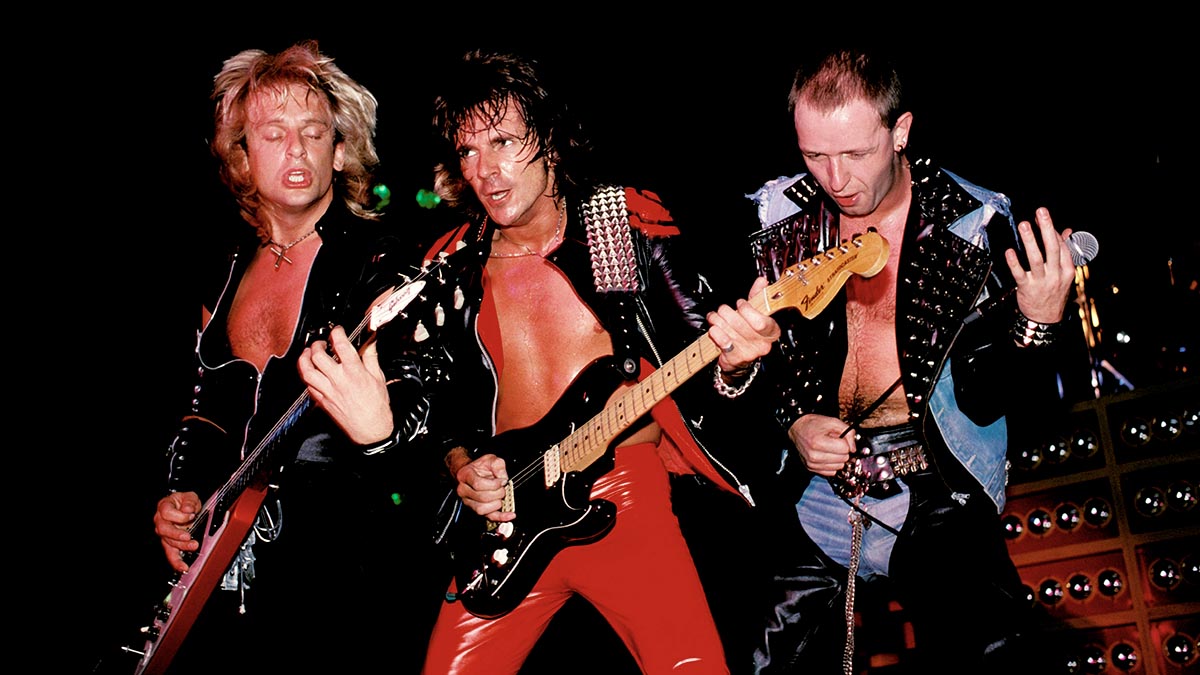
The guitar work in Judas Priest has rubbed off on so many styles of metal: the New Wave of British Heavy Metal, thrash, melodic death metal, and even metalcore. Do you ever feel like any of those subsequent bands perhaps bastardized what you pioneered?
“I used to get asked, ‘What did you think of the punk and new wave era?’ Truthfully, I thought it was great because without too much skill people can come up with songs that have so much energy. We tend to learn from everybody and I’m not ashamed to admit it.
“That era gave us a kick up the backside to become more motivated and to write songs that were more gritty and rough. As a musician, you get something from everything and I definitely was altered by new wave and punk. I’m flattered by anyone who gets anything from our music, and I just think that if you keep an open mind you can learn something from everybody, and you should.”
What can you say about the next Judas Priest studio album? Were you able to work on it between 2019 and 2020 when Covid shut down the tour business?
“No, the pandemic stopped us in our tracks. But me, Richie, and [vocalist] Rob [Halford] went into the studio and wrote some stuff before that. I’m really happy with what we’ve done. The riffs are very strong and I think it will be a great album. If you went back and listened to the last two albums, you can feel the creativity there, and there’s a lot more to come.”
Were you able to play guitar parts for the next album or did you communicate your musical ideas to Richie and have him play them?
“I went into it with the understanding that I had to adapt. I have to realize my limitations. Basically, you just have to deal with what life throws at you and make the best of it. I don’t try to set the mark too high now because, obviously, my condition means I can’t play guitar like I used to. But I can still build songs and I can still get a mean riff out. So we’ll see how it goes when we get back in there and continue writing. I’m very much looking forward to that.”
In August 2021 at Bloodstock Open Air in Walton-on-Trent, Derbyshire, you joined Priest at their first show in two years to play Metal Gods, Breaking the Law and Living After Midnight. Do you plan to make more special appearances during the remaining anniversary shows?
“I certainly hope to get up to maybe play a few numbers and encores. And, honestly, I look forward to that just as much as I used to. When you hear that crowd roar, there’s no other feeling like it. But I have to be realistic. If I feel up to it, I’ll do it [at some shows], but I have a family and I’m not going to jeopardize my health.”
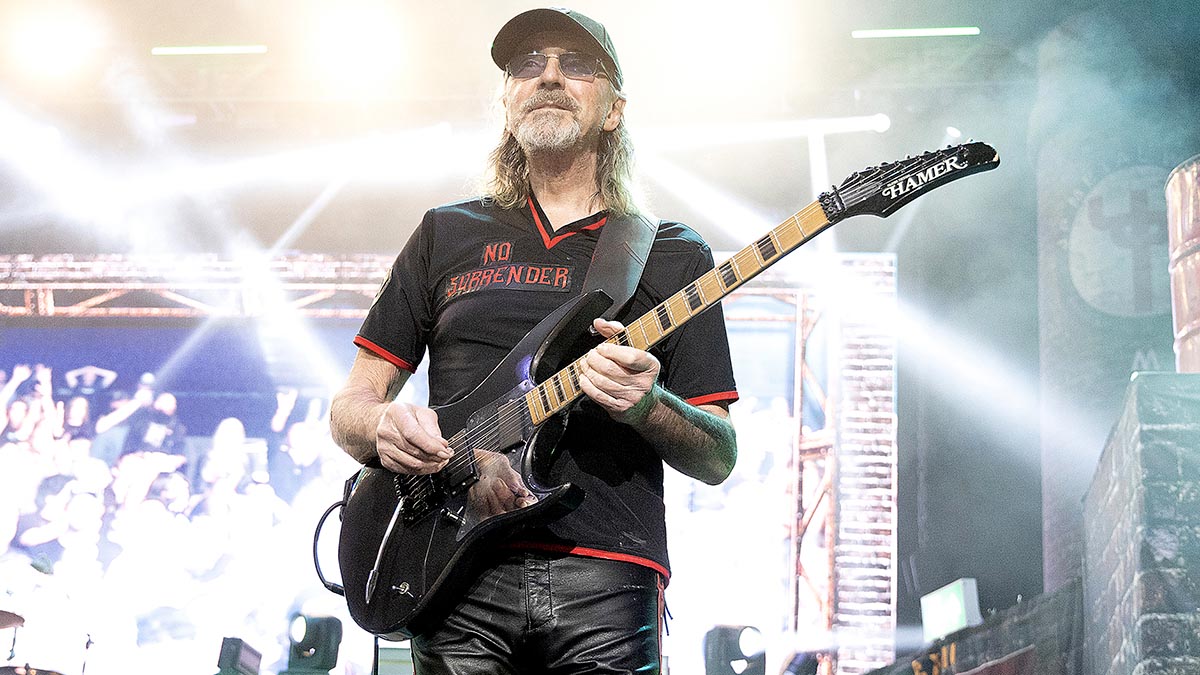
On September 26 at the Louder Than Life festival in Louisville, Kentucky, Richie suffered an acute cardiac aortic dissection onstage during the closing number, Painkiller. The condition is often fatal, but the venue was near Rudd Heart & Lung Center at University of Louisville Health at Jewish Hospital, which had the staff and technology to perform a 10-hour emergency procedure that saved his life. Is Richie back up to speed or is he still regaining his strength from the condition and his post-op rehabilitation?
“I’ve talked to him and he’s pretty much up to speed. It’s incredible. He really had a close shave. But he’s amazing. He never puts that guitar down. I spoke to him briefly two or three nights ago, and he sounded good. But you have to be careful with any problems like that because what you need is rest. And what he wants to do is play the guitar, and that’s not always restful.”
Richie’s a very talented player and a strong character. To pull through that and get to where he’s gotten now and be determined to get back in shape takes a lot of effort
At the same time, the guitar can be a great therapeutic tool. When patients come out of a major trauma, they often want to get back into their comfort zone and Richie looks more comfortable than ever when he’s sitting there just noodling away.
“He’s a very talented player and a strong character. To pull through that and get to where he’s gotten now and be determined to get back in shape takes a lot of effort. And when he was getting back up to speed, it was probably very hard for him because he didn’t have a lot of energy. But like I say, he’s doing good and he’s enjoying playing the guitar.”
You suffered your own setback recently when you were outside your house with your dog. It wasn’t exactly a brush with death, but it might have been.
“Four months ago, I fell down a riverbank and shattered my shoulder and broke my arm. I couldn’t move. It was about nine o’clock at night and I jumped down to this path and my foot slipped and I fell and landed on my shoulder. I couldn’t get up. I couldn’t put any pressure on the arm to give me leverage to stand.
“I had to stay in that position all night. It started to rain and I thought I might catch my death from the cold. It was the worst night of my life. My dog, a German wirehaired pointer, stayed with me for 10 hours.
“In the early morning, the guy that looks after my land and the estate knew something was wrong because he couldn’t see the dog. So he went down to look around and then he saw the dog and me and got me help.”
You’ve always been the quintessential polite English gentleman. The same could be said for most everyone in Priest, until recently. Over the past couple years, former Priest guitarist K.K. Downing has been bad mouthing you and the rest of the band. First, he made some comments in his 2018 book Heavy Duty: Days and Nights in Judas Priest. More recently, when he released the first album by his new band KK’s Priest, Sermons of the Sinner, he targeted you with more accusations.
“You know, I never wanted to get into a public argument after K.K. left. I never said a word and I stuck to my guns for over 10 years, but there comes a point when you read things that have been said that are just crazy. It’s time to say something, really because he’s saying things that he really shouldn’t be saying. They aren’t fair.”
Are they mean or are they untrue?
“Both. He’s insinuated that he was the driving force of the band. It just isn’t true, you know? Priest are made up of five guys working together. They’re not just one person driving the band. He’s said all these things that, I think, are meant to upset us and get us to say something in response and for a long time we didn’t. But I’ve got a lot to say and enough’s enough.”
K.K. seems unhappy he’s no longer in the band. He said that the Epitaph tour in 2011 and 2012 was supposed to be a farewell run and that you had all agreed to break up after the dates. So when he quit the band before the tour, he claims he did so under the impression that there would be no more Judas Priest studio albums or shows. In other words, you were all leaving the band after the tour.
“We spoke about what was probably going to be our farewell tour, and then Ken [K.K.] quit. Nothing could have been worse because after you play for all those years, you plan your farewell tour to sign off in a good way. All of a sudden, Ken quit and we didn’t know what to do. It was a nightmare.
“It was only when we found Richie that we realized we could go on and play the tour and then more. Richie injected so much speed and energy into the band that we decided to continue. He’s such a great fellow and a great player. When he doesn’t know there’s anyone around and he’s in the studio just playing random things, some of the stuff he comes up with is breathtaking, even for me. He can play anything.”
Richie injected so much speed and energy into the band that we decided to continue. He’s such a great fellow and a great player
What did K.K. say about you that was most upsetting?
“There was that ridiculous thing he said about me having to play the last note at a concert [so I would come across as the band’s star guitarist]. The fans aren’t stupid. They know what’s true and what isn’t true.”
Were those accusations unexpected?
“They were surprising.”
One of K.K.’s more personal jabs was that you were drinking too much on stage and your playing was sloppy during his final tours with the band.
“That’s silly, really, and everyone knows it’s not true. The fans aren’t stupid and they’ve seen me for 50 years playing around the world. I may have had a couple of beers onstage, but that’s all. It’s never affected the concert or my performance whatsoever and he knows that. Also, he said we asked him to play the hard parts.
“Just tell that to Tom Allom and he’ll fall down laughing. Anyone who’s worked with us in the studio or live knows who plays the hard parts. Ken was there most of the time with me and we’ve written songs together. I’ve done nothing but help Ken.”
Did he need help?
“I used to piece his leads together and I did a lot of editing to make his lead breaks worthwhile. I would never have talked about Ken that way, it’s just that his accusations have gotten sillier and sillier – and I deserve [the chance] to respond. He left the band. We couldn’t convince him to stay. And then he accused me of taking six years off to write two solo albums. I only did the solo albums because we were inactive at the time while Rob was doing his solo things.”
After you announced you weren’t going to play the Firepower tour, K.K. seemed hurt that he wasn’t asked to rejoin. He said he contacted bassist Ian Hill, who sent him a setlist, but nothing ever happened.
“He never approached any of the band and asked to rejoin, so for all we knew, he didn’t want to rejoin. He said he wanted to leave the band and then leave the music industry. He told us he was desperate for a new kind of life.”
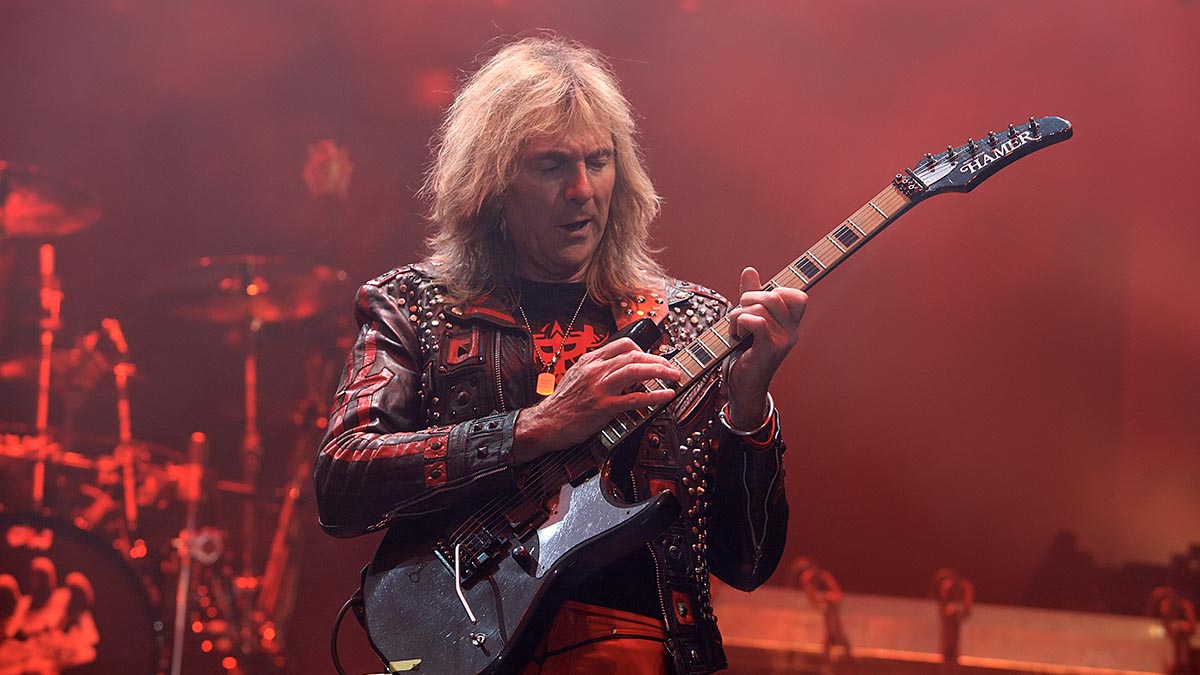
He didn’t ask to rejoin for the Firepower tour?
“No. Right before we got Richie, Ian said, ‘If you really want to come back, you’d better come back now’ because we were moving on. But he didn’t do anything. He didn’t ask to come back. And then after he was out, he said all sorts of ridiculous things. He tried to take credit for just about everything – the stage clothes, the image, the songwriting. He refers to them as his songs.
“He’s got to be joking. Everybody knows who wrote the songs, and that’s being kind. But whatever the case was, we’ve always made it clear that all of the decisions we made were made by the band as a whole, without exception. If anyone doesn’t agree with something, it isn’t used. That’s the way we’ve always worked.”
I always considered me and Ken to be friends. We had some great times. We’ve been fishing together. We played tennis in courts that were so rough there were roots growing up through the cracks
It must have taken a lot of willpower to keep your silence for so long.
“I never wanted this kind of back-and-forth thing, but you can imagine how I feel – especially now that my playing has become more difficult – and he’s continued bashing me in the press and in his book.”
Was there always tension between you and K.K.?
“That’s the thing. I always considered me and Ken to be friends. We had some great times. We’ve been fishing together. We played tennis in courts that were so rough there were roots growing up through the cracks. We’ve sat on the 18th hole of many golf courses and had a laugh. So it shouldn’t be like this.”
Were you surprised that the new KK’s Priest album is called Sermons of the Sinner, an obvious reference to the Priest song The Sinner, and that his lyrics are filled with animosity against Judas Priest? Also, The Return of the Sentinel includes the opening guitar line from the Priest song The Sentinel.
“I suppose if I left a band and regretted it then I’d try to regain that energy from tracks I’d loved and played throughout the years. Therefore, I suppose it’s a natural thing to want to lean toward the music that you love. So I can understand that. I just can’t understand why he’s saying things that people know aren’t true.”
Do you think it’s strange that K.K. hired ex-Priest vocalist Tim “Ripper” Owens and worked with drummer Les Binks? Does it seem he’s trying too hard to step back up on the Priest pedestal?
I just wish K.K.’d grow up a bit and stop saying ridiculous things. I’d like to see both bands go on and enjoy heavy metal
“It’s difficult for me to comment on that, really. When I did my solo album, the songs were very un-Priest-like. They were just songs I wanted to get off my chest. Why would I want to play something that sounded like Priest? I think a solo album should be different from your main band because you let your emotions come out in different ways.
“But Ken wanted to make music like he did in Priest. I have no problem with Ripper [being involved]. I always got along with him. Tim’s a good singer and it was good to play with him in Priest for a number of years.”
So, you’re okay with Judas Priest and K.K.’s Priest existing at the same time.
“I just wish he’d grow up a bit and stop saying ridiculous things. I’d like to see both bands go on and enjoy heavy metal, as you should do. It would be nice to see our careers out together, even if we’re in different bands.”
- Reflections – 50 Heavy Metal Years of Music is out now via Legacy Recordings.
Jon is an author, journalist, and podcaster who recently wrote and hosted the first 12-episode season of the acclaimed Backstaged: The Devil in Metal, an exclusive from Diversion Podcasts/iHeart. He is also the primary author of the popular Louder Than Hell: The Definitive Oral History of Metal and the sole author of Raising Hell: Backstage Tales From the Lives of Metal Legends. In addition, he co-wrote I'm the Man: The Story of That Guy From Anthrax (with Scott Ian), Ministry: The Lost Gospels According to Al Jourgensen (with Al Jourgensen), and My Riot: Agnostic Front, Grit, Guts & Glory (with Roger Miret). Wiederhorn has worked on staff as an associate editor for Rolling Stone, Executive Editor of Guitar Magazine, and senior writer for MTV News. His work has also appeared in Spin, Entertainment Weekly, Yahoo.com, Revolver, Inked, Loudwire.com and other publications and websites.
"Upgrading from your entry-level acoustic opens the door to an entirely new world of tonewoods, body shapes, and brands": 6 signs it's time to upgrade from your first acoustic guitar
"I'm past my prime": 5 common excuses for not learning the guitar – and 5 body and mind-boosting reasons you should
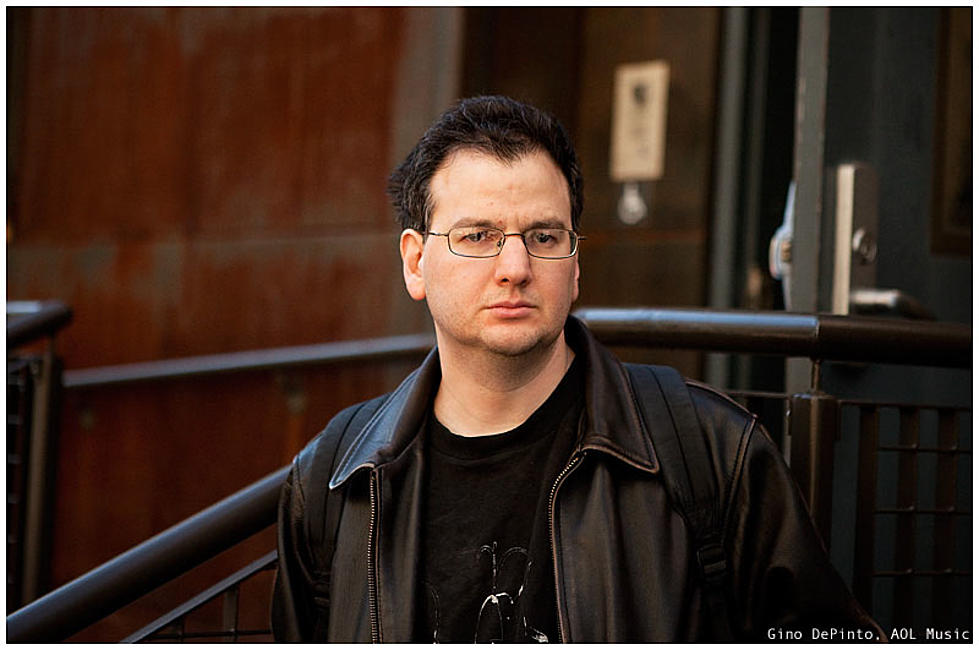

![John Mayer and Bob Weir [left] of Dead & Company photographed against a grey background. Mayer wears a blue overshirt and has his signature Silver Sky on his shoulder. Weir wears grey and a bolo tie.](https://cdn.mos.cms.futurecdn.net/C6niSAybzVCHoYcpJ8ZZgE.jpg)

![A black-and-white action shot of Sergeant Thunderhoof perform live: [from left] Mark Sayer, Dan Flitcroft, Jim Camp and Josh Gallop](https://cdn.mos.cms.futurecdn.net/am3UhJbsxAE239XRRZ8zC8.jpg)






